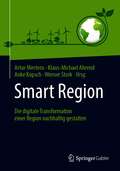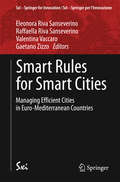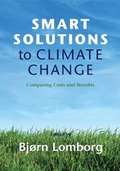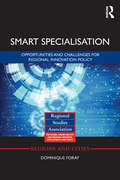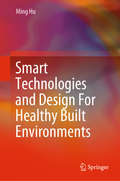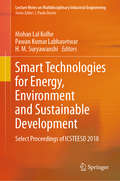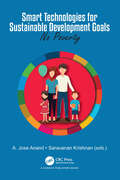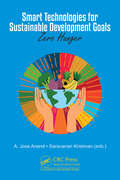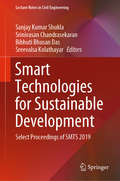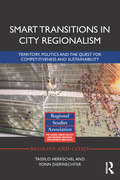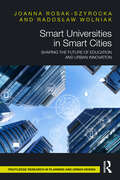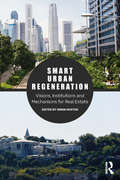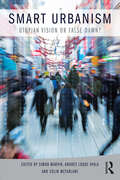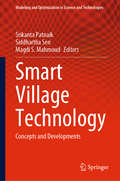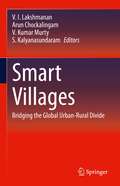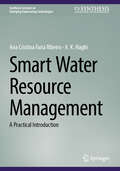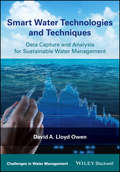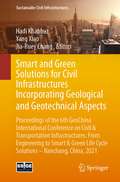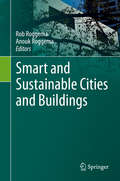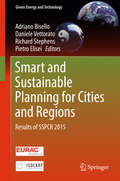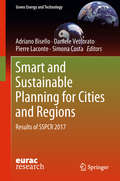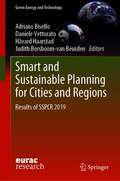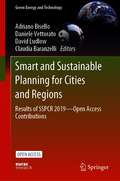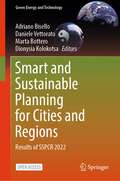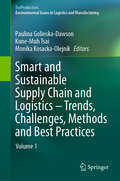- Table View
- List View
Smart Region: Die digitale Transformation einer Region nachhaltig gestalten
by Artur Mertens Klaus-Michael Ahrend Anke Kopsch Werner StorkDie digitale Transformation stellt nicht nur die Unternehmenswelt vor große Herausforderungen, sondern nimmt auch auf viele Lebensbereiche der Menschen einer Region enormen Einfluss. Zur Erprobung der Ausgestaltung des regionalen Entwicklungspotenzials finden derzeit erste Pilotprojekte statt. Die bisherigen Ergebnisse machen deutlich, dass die wesentlichen Entwicklungen innerhalb von vier Lebensbereichen – dem Zuhause, der Arbeit, dem öffentlichen Raum und der Mobilität – stattfinden und sich Städte und Gemeinden den neuen Chancen öffnen sollten. Im Fokus dieses Buches steht der regionale Lebensraum und seine Entwicklungen hin zu einer „Smart Region“ in Bezug auf ökonomische, ökologische und soziale Kriterien. Anerkannte Experten aus Wissenschaft und Praxis beantworten aktuelle Fragen, wie beispielsweise• was sind die entscheidenden Dimensionen einer smarten Region,• wie können Maßnahmen und Aktivitäten entwickelt, umgesetzt und koordiniert werden und• was ist bei der regionalen Verankerung und der Messung des Erfolges zu beachten.Die Autoren zielen darauf ab, über die Darstellung der Grundlagen einen soliden Zugang zu diesem Thema zu geben. Best-Practice-Beispiele und regionale Perspektiven inspirieren und regen zum Nachdenken an.Eine gelungene Symbiose aus Theorie und Praxis macht das Werk zu einer Pflichtlektüre für alle, die sich mit der Entwicklung von Smart Cities und Smart Regions befassen. Damit trägt es zur Verbesserung der Lebensqualität bei, ganz im Sinne der Third Mission der Hochschule Darmstadt.Prof. Dr. Ralph Stengler, Präsident der Hochschule DarmstadtEin ausgezeichnetes Buch! Die ausgewählten Praxisbeispiele und dargestellten strategischen Leitplanken lassen hoffen, dass sich in Deutschland die Digitalisierung des öffentlichen Sektors beschleunigt. Eine exzellente digitale Infrastruktur ist eine zentrale Voraussetzung, um nachhaltig im Standortwettbewerb zu bestehen. Ich empfehle das Werk allen politisch Verantwortlichen.Isabel de Paoli, Chief Strategy Officer, Merck KGaA
Smart Rules for Smart Cities
by Eleonora Riva Sanseverino Raffaella Riva Sanseverino Valentina Vaccaro Gaetano ZizzoThis book explores the new rules and codes that are required in order to foster the implementation of smart city technologies with a view to meeting the environmental and energy challenges posed by dynamic contemporary cities with increasing populations. In particular, it proposes a methodological approach suitable for use when devising a smart urban/building code for local administrations, taking into account the current European regulatory framework (directives and technical norms) and evaluating the economic feasibility of the suggested measures. A case study is made of a large Mediterranean city in Italy that can be regarded as a paradigm of urban evolution, where a traditional individualism poses a cultural obstacle to the emerging need to share resources. Further features include a smart cities atlas, explanation of how to create local rules for sustainable building restoration/construction, and guidance on economic evaluation of the impact of building automation and passive measures for energy efficiency. The book, which has a multidisciplinary perspective, will be of value to all who are interested in the transition to smart cities that can meet sustainable development targets.
Smart Solutions to Climate Change: Comparing Costs and Benefits
by Bjørn LomborgThe failure of the Copenhagen climate conference in December 2009 revealed major flaws in the way the world's policy makers have attempted to prevent dangerous levels of increases in global temperatures. The expert authors in this specially commissioned collection focus on the likely costs and benefits of a very wide range of policy options, including geo-engineering, mitigation of CO2, methane and 'black carbon', expanding forest, research and development of low-carbon energy and encouraging green technology transfer. For each policy, authors outline all of the costs, benefits and likely outcomes, in fully referenced, clearly presented chapters accompanied by shorter, critical alternative perspectives. To further stimulate debate, a panel of economists, including three Nobel laureates, evaluate and rank the attractiveness of the policies. This authoritative and thought-provoking book will challenge readers to form their own conclusions about the best ways to respond to global warming.
Smart Specialisation: Opportunities and Challenges for Regional Innovation Policy (Regions and Cities)
by Dominique ForayThis is the first book on a new policy approach that has been widely adopted in Europe and beyond. It analyses the concept of smart specialisation and discuss the need for smart specialisation strategies, explains why the approach is new and different from more standard policy processes and explores what are the conditions for successful implementation. Smart Specialisation: Opportunities and Challenges for Regional Innovation Policy describes the origin of the concept, explains when a smart specialisation policy is necessary, provides a detailed analysis of the design principles of the policy and discuss the pertinence of this approach according to regional development levels. Finally the book discuss the practical implementation phase of the process – based on the first feedback acquired from certain regions engaged in the preparation of their smart specialisation strategy. The book is original in that it provides the first full analysis of smart specialisation strategies both at theoretical and practical levels. It has been written at the critical period of the implementation of smart specialisation strategies in every region in Europe. The fact that the EU has adopted smart specialisation as a mandatory principle for every region and member states will make this book well received by and very useful for: i) policy makers in regional and national administrations in Europe, ii) policy makers in other parts of the world who are in charge of regional policy and have heard about the concept, iii) consultants, analysts and experts who are active on the "markets for smart specialisation diagnosis and expertise", iv) scholars, researchers and graduate students working in the field of regional studies, technology policy and geography of innovation.
Smart Technologies and Design For Healthy Built Environments (Springerbriefs In Applied Sciences And Technology Ser.)
by Ming HuSmart Technologies and Design for Healthy Built Environment connects smart technology to a healthy built environmentthat builds upon the sustainable building movement.It provides an overall summary of the state-of-the-art technologies that are applied in the built environment. The book covers a broad spectrum of smart technology categories ranging from dynamic operability, energy efficiency, self-regulating and self-learning systems, and responsive systems. The foreseeable challenges that are associated with smart technologies are discussed and outlined in the book. Firstly, this book provides a snapshot of state-of-the-art smart technologies being applied in the built environment. It covers a broad spectrum of smart technology categories, ranging from dynamic operability, energy efficiency, self-regulating and self-learning systems, to responsive systems. Secondly, this book provides in-depth analysis of the four primary components of health (biological, physical, physiological and psychological); their effects on wellbeing and cognitive performance are introduced as well. Thirdly, it connects smart technologies to those health-influencing factors by reviewing three completed smart building projects. This book can also serve as a basis for education and discussion among professionals and students of diverse backgrounds who are interested in smart technologies, smart building, and healthy building. Smart Technologies and Design for Healthy Built Environment serves as the basis for education and discussions among professionals and students who are interested in smart technologies, smart building and healthy building, as it bridges the gap between smart technologies and a healthy built environment. The book also provides a foundation for anyone who is interested in the impact of smart technology on the health of built environment.
Smart Technologies for Energy, Environment and Sustainable Development: Select Proceedings of ICSTEESD 2018 (Lecture Notes on Multidisciplinary Industrial Engineering)
by Mohan Lal Kolhe Pawan Kumar Labhasetwar H. M. SuryawanshiThis book comprises select proceedings of the International Conference on Smart Technologies for Energy, Environment, and Sustainable Development (ICSTEESD 2018). The chapters are broadly divided into three focus areas, viz. energy, environment, and sustainable development, and discusses the relevance and applications of smart technologies in these fields. A wide variety of topics such as renewable energy, energy conservation and management, energy policy and planning, environmental management, marine environment, green building, smart cities, smart transportation are covered in this book. Researchers and professionals from varied engineering backgrounds contribute chapters with an aim to provide economically viable solutions to sustainable development challenges. The book will prove useful for academics, professionals, and policy makers interested in sustainable development.
Smart Technologies for Sustainable Development Goals: No Poverty
by Saravanan Krishnan A. Jose AnandSustainable Development Goals or SDGs refer to the UN stipulated road-map for development in 17 defined areas, by 2030. It was built on the previously established Millennium Development Goals (MDG). This first volume (SDG-1) deals with eradicating poverty with the help of modern ICT technologies needed to end poverty and create a better society. This much needed book, which is the first of its type to offer a specific focus on the relationship between technology and the SDG-1 goal, will be valuable for all working in the subject of global sustainable development. Global organisations and representatives of governments targeting no poverty share knowledge on these ICT practices to eradicate poverty in all means.
Smart Technologies for Sustainable Development Goals: Zero Hunger
by Saravanan Krishnan A. Jose AnandSustainable Development Goals (SDGs) give the UN a road-map for development, with Agenda 2030 as the target. It was built on the previously established Millennium Development Goals (MDGs). This book examines the supporting technologies needed to achieve SDG 2: reducing hunger and creating a better society. This much-needed book, the first of its type to offer a specific focus on the relationship between technology and SDG 2, will be valuable for academics working in the subject of global sustainable development. This book will also be useful for international organisations and representatives, who will be able to share knowledge on technological views to minimise hunger rates.
Smart Technologies for Sustainable Development: Select Proceedings of SMTS 2019 (Lecture Notes in Civil Engineering #78)
by Srinivasan Chandrasekaran Sanjay Kumar Shukla Sreevalsa Kolathayar Bibhuti Bhusan DasThis book presents select papers from the International Conference on Smart Materials and Techniques for Sustainable Development (SMTS) 2019. The contents focus on a wide range of methods and techniques related to sustainable development fields like smart structures and materials, innovation in water resource development, optical fiber communication, green construction materials, optimization and innovation in structural design, structural dynamics and earthquake engineering, structural health monitoring, nanomaterials, nanotechnology and sensors, smart biomaterials and medical devices, materials for energy conversion and storage devices, and IoT in sustainable development. This book aims to provide up-to-date and authoritative knowledge from both industrial and academic worlds, sharing best practice in the field of smart materials analysis. The contents of this book will be beneficial to students, researchers, and professionals working in the field of smart materials and sustainable development.
Smart Transitions in City Regionalism: Territory, Politics and the Quest for Competitiveness and Sustainability (Regions and Cities)
by Tassilo Herrschel Yonn DierwechterIn recent years "smartness" has risen as a buzzword to characterize novel urban policy and development patterns. As a result of this, debates around what "smart" actually means, both theoretically and empirically, have emerged within the interdisciplinary arenas of urban and regional studies. This book explores the changes in discourse, rationality and selected responses of smartness through the theme of "transition." The concept of transition provides the broader context and points of reference for adopting smartness in reconciling competing interests and agendas in city-regional governance. Using case studies from around the world, including North America, Europe and South Africa, the authors link external regime transition in societal values and goals with internal moves towards smartness. While reflecting the growing integration of overarching themes and analytical concerns, this volume further develops work on smartness, smart growth, transition, city-regionalism, governance and sustainability. Smart Transitions in City Regionalism explores how smart cities and city regions interact with conventional state structures. It will be of great interest to postgraduates and advanced undergraduates across urban studies, geography, sustainability studies and political science.
Smart Universities in Smart Cities: Shaping the Future of Education and Urban Innovation (Routledge Research in Planning and Urban Design)
by Radosław Wolniak Joanna Rosak-SzyrockaSmart Universities in Smart Cities: Shaping the Future of Education and Urban Innovation focuses on how higher education institutions are adapting to the challenges of the digital age in a world increasingly influenced by technology and sustainability. Universities are becoming an indispensable element of smart cities, driving forward innovation, sustainability, and urban living.The book explores how emerging technologies such as AI, IoT, and blockchain are transforming campuses into dynamic, data-driven ecosystems. Both of these dimensions are studied through data analytics, case studies, and futuristic thinking perspectives to identify opportunities and challenges of the establishment of smart universities within the broader ecosystem of smarter cities. The book offers a holistic approach to planning educational institutions, covering issues such as sustainable campus development, digital learning environments, and smart mobility solutions.As universities undergo digital transformation, they advance not only learning but also the larger role of academia in society. The book envisions the future, where intelligent campuses act as centres of knowledge, collaboration, and sustainable development, propelling the world into a smarter and more inclusive reality for future generations. It will be of interest to researchers and students of urban planning and sustainability studies, as well as to urban planners and policymakers.
Smart Urban Regeneration: Visions, Institutions and Mechanisms for Real Estate
by Simon HustonThe role of real estate in our cities is crucial to building sustainable and resilient urban futures. Smart Urban Regeneration brings together institutional, planning and real estate insights into an innovative regeneration framework for academics, students and property professionals. Starting by identifying key urban issues within the historical urban and planning backdrop, the book goes on to explore future visions, the role of institutions and key mechanisms for smart urban regeneration. Throughout the book, international case studies and discussion questions help to draw out global implications for urban stakeholders. Real estate professionals face a real challenge to build visionary developments which resonate locally yet mitigate climate change and curb sprawl, and foster biodiversity. By avoiding the dangers of speculative excess on one side and complacency on the other, Smart Urban Regeneration shows how transformation aspirations can be achieved sustainably. Academics, students and professionals who are involved in real estate, urban planning, property investment, community development and sustainability will find this book an essential guide to smart urban regeneration investment.
Smart Urbanism: Utopian vision or false dawn?
by Simon Marvin, Andrés Luque-Ayala and Colin McFarlaneSmart Urbanism (SU) – the rebuilding of cities through the integration of digital technologies with buildings, neighbourhoods, networked infrastructures and people – is being represented as a unique emerging ‘solution’ to the majority of problems faced by cities today. SU discourses, enacted by technology companies, national governments and supranational agencies alike, claim a supremacy of urban digital technologies for managing and controlling infrastructures, achieving greater effectiveness in managing service demand and reducing carbon emissions, developing greater social interaction and community networks, providing new services around health and social care etc. Smart urbanism is being represented as the response to almost every facet of the contemporary urban question. This book explores this common conception of the problematic of smart urbanism and critically address what new capabilities are being created by whom and with what exclusions; how these are being developed - and contested; where is this happening both within and between cities; and, with what sorts of social and material consequences. The aim of the book is to identify and convene a currently fragmented and disconnected group of researchers, commentators, developers and users from both within and outside the mainstream SU discourse, including several of those that adopt a more critical perspective, to assess ‘what’ problems of the city smartness can address The volume provides the first internationally comparative assessment of SU in cities of the global north and south, critically evaluates whether current visions of SU are able to achieve their potential; and then identifies alternative trajectories for SU that hold radical promise for reshaping cities.
Smart Village Technology: Concepts and Developments (Modeling and Optimization in Science and Technologies #17)
by Magdi S. Mahmoud Siddhartha Sen Srikanta PatnaikThis book offers a transdisciplinary perspective on the concept of "smart villages" Written by an authoritative group of scholars, it discusses various aspects that are essential to fostering the development of successful smart villages. Presenting cutting-edge technologies, such as big data and the Internet-of-Things, and showing how they have been successfully applied to promote rural development, it also addresses important policy and sustainability issues. As such, this book offers a timely snapshot of the state-of-the-art in smart village research and practice.
Smart Villages: Bridging the Global Urban-Rural Divide
by V. Kumar Murty Arun Chockalingam V. I. Lakshmanan S. KalyanasundaramThis book brings together technical expertise, best practices, case studies and ground-level application of the ideas for empowering the rural population of the world to live economically prosperous, environmentally sustainable, and socially progressive lives, on par or comparable with the quality of life enjoyed by the global urban population. The idea of Smart Villages takes on greater urgency in light of the investments made in this millennium on “Smart Cities”, taking advantage of the technological advances, particularly in digital connectivity. These investments have and will continue to expand the urban-rural divide, unless similar investments are made in the villages as well. The book provides a much-needed guide for a holistic development of a Smart Village, by defining the need, developing the framework, and describing the delivery, complete with successful case studies. Contributors to the book, from Canada, USA, Africa and India bring years of academic, industry and governmental experience, including organization of several Smart Village conferences. The knowledge base in the book will be of great value to anyone interested in or active in rural planning, including governmental and non-governmental organizations, industrial solution providers, public healthcare professionals, public policy professionals and students, as well as rural communities around the world. Consolidates all the aspects of creating/developing a Smart Village;Delivers an effective tool-kit for practitioners in the area of Smart Villages;Provides a policy-based framework for the development of an ideal Smart Village;Illustrates, through case studies, the fulfillment of key requirements of a Smart Village;Brings together experts from around the world to share their vision of a Smart Village;Highlights the importance of balancing development with social/gender equity and cultural traditions.
Smart Water Resource Management: A Practical Introduction (Synthesis Lectures on Emerging Engineering Technologies)
by A. K. Haghi Ana Cristina RibeiroAdvanced methods for water consumption management can help save water and financial resources. This book introduces efficient methods and practical approaches for water consumption management through computational modeling to forecast water demand and optimization and through smart technology to help prevent or reduce water loss using the Geographic Information Systems (GIS) and the Internet of Things (IoT). The book will be a useful for researchers and graduate students focusing on research initiatives in the field of water resource management, and for researchers and practicing engineers in water utility companies.
Smart Water Technologies and Techniques: Data Capture and Analysis for Sustainable Water Management (Challenges in Water Management Series)
by David A. Lloyd OwenAn Insightful Examination of Smart Water Systems and Technology Inland water supplies are under increasing pressure. Climate, social, and demographic change have begun tipping the balance toward demand management, as supplies begins to dwindle. Water and wastewater infrastructure will play a central role in the management of this increasingly valuable resource, and Smart Water Technologies and Techniques: Data Capture and Analysis for Sustainable Water Management provides insight on a key part of the solution. Smart water applications optimise the way water and wastewater services are used, allowing more efficient allocation of limited resources while adding flexibility to the system. Automation, real-time data capture, and rapid interpretation allow utilities and users to monitor, manage, and act on the part of the water cycle that matters to them, minimizing costs of providing service through optimal use of extant assets. This book brings together the core principles, key developments, and current state-of-the-art into a single resource that: Considers smart water within operational, economic, policy, and regulatory contexts Provides a comprehensive overview of the smart water concept and the latest advances in the field Examines key considerations and objections raised to date Discusses the potential value of smart water, from perception to policy Shows how smart water systems can optimize efficiency and flexibility of water and wastewater management Explores future directions for smart water development in the pursuit of balanced supply and demand Although primarily designed for water supply and sanitation, smart water systems may be applied to irrigation, reservoir and dam management, inland water flows, and more, making it a valuable asset as water scarcity begins to spread around the globe. This book answers the questions, assuages concerns, and explains the technology that could revolutionize the way water is accessed and supplied.
Smart and Green Solutions for Civil Infrastructures Incorporating Geological and Geotechnical Aspects: Proceedings of the 6th GeoChina International Conference on Civil & Transportation Infrastructures: From Engineering to Smart & Green Life Cycle Solutions -- Nanchang, China, 2021 (Sustainable Civil Infrastructures)
by Yang Xiao Jia-Ruey Chang Hadi KhabbazAdvancement in design and construction to embrace the impact of rapid global urbanization growth in infrastructure development is inevitable. This proceedings volume includes many smart and green solutions for civil infrastructures, incorporating geotechnical and engineering geology aspects. The articles presented in this volume are attempts made by the researchers and practitioners to address many geotechnical challenges, based on the state-of-the-art practices, innovative technologies, new research results and case histories in construction and design towards safer and cost effective infrastructures. This volume covers a wide range of topics with direct relevance to people within the broad field of geomechanics, including consultants, contractors, academics, materials suppliers and the owners and operators of civil infrastructures. Many papers associated with numerical modeling of transport infrastructure, advanced soil and rock testing, field monitoring, tunnelling, expansive soils, geo-center motion, triaxial and dynamic testing, piles etc. are included. The content is based on the contributions to the 6th GeoChina International Conference on Civil & Transportation Infrastructures: From Engineering to Smart & Green Life Cycle Solutions -- Nanchang, China, 2021.
Smart and Sustainable Cities and Buildings (Contemporary Urban Design Thinking Ser.)
by Rob Roggema Anouk RoggemaThis book brings together the papers presented at the Smart and Sustainable Built Environments Conference, 2018 (SASBE).This latest research falls into two tracks: smart and sustainable design and planning cities; and the technicalities of smart and sustainable buildings. The growth of smart cities is evident, but not always linked to sustainability. This book gives an overview of the latest academic developments in increasing the smartness and sustainability of our cities and buildings. Aspects such as inclusivity, smart cities, place and space, the resilient city, urbanity and urban ecology are prominently featured in the design and planning part of the book; while energy, educational buildings, comfort, building design, construction and performance form the sub-themes of the technical part of the book. This book will appeal to urban designers, architects, urban planners, smart city designers and sustainable building experts.
Smart and Sustainable Planning for Cities and Regions
by Richard Stephens Adriano Bisello Daniele Vettorato Pietro EliseiThis book presents cutting-edge work on innovative planning methodologies, tools and experiences aimed at supporting the transition of our cities and regions towards a more smart and sustainable dimension. This book comprises a selection of the best papers presented at the international conference "Smart and Sustainable Planning for Cities and Regions 2015", held in November 2015 in Bolzano, Italy. Contributions from different research fields within urban and regional planning from the scientific as well as the professional community are presented: energy planning for cities and regions, how to couple the energy-climate goals with the development or renovation of the built environment and how to tackle the vulnerability to climate change; smart and sustainable technologies, big data, integrated infrastructures and mobility management, from holistic geospatial tools to innovative apps and Internet of Things; benefits, costs and opportunities of urban transition toward a more smart and sustainable dimension, accounting and assessment of values and trade-offs within the decision making processes; governance for smart and sustainable growth, fostering place-based policy-making, active and effective stakeholders' participation, co-production and public-private partnerships; cooperation and demonstration projects: their role in fostering the adoption of new approaches and technologies, towards the development of win-win solutions.
Smart and Sustainable Planning for Cities and Regions: Results Of Sspcr 2015 (Green Energy And Technology)
by Adriano Bisello Daniele Vettorato Pierre Laconte Simona CostaThis book comprises a selection of the top contributions presented at the second international conference “Smart and Sustainable Planning for Cities and Regions 2017”, held in March 2017 in Bolzano, Italy. Featuring forty-six papers by policy-makers, academics and consultants, it discusses current groundbreaking research in smart and sustainable planning, including the progress made in overcoming cities’ challenges towards improving the quality of life. Climate change adaptation and mitigation of global warming, generally identified as drivers of global policies, are just the “tip of the iceberg” when it comes to smart energy transition. Indeed, equally relevant towards this current transformation – and key topics in this volume – are ICTs, public spaces and society; next economy for the city; strategies and actions for good governance; urban-rural innovation; rethinking mobility. The book’s depth in understanding and insightfulness in re-thinking demonstrate the breaking of new ground in smart and sustainable planning. A new ground that policy-makers, academics and consultants may build upon as a bedrock for smart and sustainable planning.
Smart and Sustainable Planning for Cities and Regions: Results of SSPCR 2019 (Green Energy and Technology)
by Judith Borsboom-van Beurden Håvard Haarstad Adriano Bisello Daniele VettoratoThis book offers a selection of research papers and case studies presented at the 3rd international conference “Smart and Sustainable Planning for Cities and Regions”, held in December 2019 in Bolzano, Italy, and explores the concept of smart and sustainable planning, including top contributions from academics, policy makers, consultants and other professionals. Innovation processes such as co-design and co-creation help establish collaborations that engage with stakeholders in a trustworthy and transparent environment while answering the need for new value propositions. The importance of an integrated, holistic approach is widely recognized to break down silos in local government, in particular, when aimed at achieving a better integration of climate-energy planning. Despite the ongoing urbanization and polarization processes, new synergies between urban and rural areas emerge, linking development opportunities to intrinsic cultural, natural and man-made landscape values. The increasing availability of big, real-time urban data and advanced ICT facilitates frequent assessment and continuous monitoring of performances, while allowing fine-tuning as needed. This is valid not only for individual projects but also on a wider scale. In addition, and circling back to the first point, (big) urban data and ICT can be of enormous help in facilitating engagement and co-creation by raising awareness and by providing insight into the local consequences of specific plans. However, this potential is not yet fully exploited in standard processes and procedures, which can therefore lack the agility and flexibility to keep up with the pulse of the city and dynamics of society. The book provides a multi-disciplinary outlook based on experience to orient the reader in the giant galaxy of smart and sustainable planning, support the transposition of research into practice, scale up visionary approaches and design groundbreaking planning policies and tools.
Smart and Sustainable Planning for Cities and Regions: Results of SSPCR 2019—Open Access Contributions (Green Energy and Technology)
by Adriano Bisello Daniele Vettorato David Ludlow Claudia BaranzelliThis open access book offers a selection of research papers and case studies presented at the 3rd international conference “Smart and Sustainable Planning for Cities and Regions”, held in December 2019 in Bolzano, Italy, and explores the concept of smart and sustainable planning, including top contributions from academics, policy makers, consultants and other professionals. Innovation processes such as co-design and co-creation help establish collaborations that engage with stakeholders in a trustworthy and transparent environment while answering the need for new value propositions. The importance of an integrated, holistic approach is widely recognized to break down silos in local government, in particular, when aimed at achieving a better integration of climate-energy planning. Despite the ongoing urbanization and polarization processes, new synergies between urban and rural areas emerge, linking development opportunities to intrinsic cultural, natural and man-made landscape values. The increasing availability of big, real-time urban data and advanced ICT facilitates frequent assessment and continuous monitoring of performances, while allowing fine-tuning as needed. This is valid not only for individual projects but also on a wider scale. In addition, and circling back to the first point, (big) urban data and ICT can be of enormous help in facilitating engagement and co-creation by raising awareness and by providing insight into the local consequences of specific plans. However, this potential is not yet fully exploited in standard processes and procedures, which can therefore lack the agility and flexibility to keep up with the pulse of the city and dynamics of society. The book provides a multi-disciplinary outlook based on experience to orient the reader in the giant galaxy of smart and sustainable planning, support the transposition of research into practice, scale up visionary approaches and design groundbreaking planning policies and tools.
Smart and Sustainable Planning for Cities and Regions: Results of SSPCR 2022 (Green Energy and Technology)
by Dionysia Kolokotsa Adriano Bisello Daniele Vettorato Marta BotteroThis open access book includes a selection of innovative contributions presented at the 4th international conference “Smart and Sustainable Planning for Cities and Regions 2022”, held in Bolzano, Italy in July 2022. Featuring 10 papers by academics and consultants, strongly rooted in practical experiences and international projects, it discusses current ground-breaking research in innovative and sustainable planning for cities, with a focus on the environmental, economic, and social challenges associated with the global sustainability transition and energy systems integration. The contributions are illustrative of the richness of the issues discussed and the breadth of the emerging themes, including innovative business models for building and infrastructure at district level, integrated sustainability assessment schemes for Positive Energy Districts, a material flow accounting model for regional metabolism, energy communities as a lever to promote historical and landscape values, optimized and electrified last-mile logistics, multi-criteria decision analysis tools to redefine center/periphery relationships, a framework for socio-spatial analysis related to social practices, design principles and communication technologies improving both indoor and outdoor public spaces, augmented nature-based solution coupling the green elements with the latest technologies to deliver healthier and more appealing cities.
Smart and Sustainable Supply Chain and Logistics – Trends, Challenges, Methods and Best Practices: Volume 1 (EcoProduction)
by Paulina Golinska-Dawson Kune-Muh Tsai Monika Kosacka-OlejnikThis book discusses the critical contemporary issues of sustainability and integration of physical and information flow. It explores the digitalization of logistics processes and the need for a more integrated and a seamless cooperation in supply chain management, which are dominant trends in business practice. Moreover, it examines how the pressure for CO2 emission reductions and more resource- efficient business models influences the organization of logistics operations on both a local and global scale, demonstrating that integrating physical and cyber systems is necessary to achieve a more environmentally friendly, safe logistics and supply chain operations. In the individual chapters, the authors discuss the new qualitative and quantitative theoretical methods and models and also analyze case studies from business practice. This book provides valuable insights for academics, Ph.D. students and practitioners wishing to deepen their understanding of logistics operations and management.
